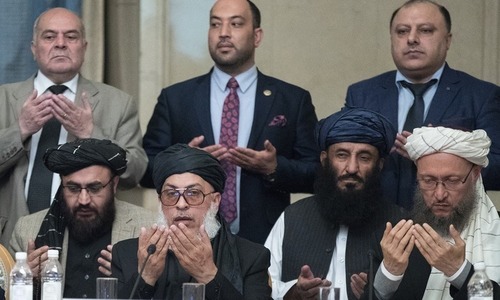WASHINGTON: If American troops pull out of Afghanistan, the Taliban might retake control of the country, warns former US Defence Secretary Robert Gates.
Mr Gates, who served under two presidents — George W. Bush and Barack Obama — from 2006 to 2011, also believes that Taliban want to take over Afghanistan and that’s why they are not negotiating with the Afghan government.
In an interview to CBS, which was broadcast on Sunday, Mr Gates agreed with the suggestion that the Afghan war might also end like the Vietnam war if the US troops were to pull out now. The war in Vietnam ended with the US withdrawal and a subsequent communist takeover of the country.
Robert Gates wants Washington to keep its troops in Afghanistan until Kabul govt becomes stable
“The former US ambassador to Afghanistan, Ryan Crocker, who you know well, compared this to Vietnam. He said, ‘You pull out your troops, it doesn’t end the war. That hands the battlefield to your adversaries.’ Do you see that?” the host asked.
“I think there’s a very real risk of that, yes,” Mr Gates replied.
“A repeat of Vietnam?” she asked.
“Well, a repeat of the government that we have supported being unable to sustain itself,” he said.
Mr Gates urged Washington to ensure that the government in Kabul is stable before bringing American forces home. There are currently 12,000 US service members stationed there.
“I think that the circumstances under which you bring them home matter.
And I think trying to give the Afghan government the best possible shot at survival is really important for the future of Afghanistan,” he said.
Mr Gates also outlined potential consequences of the Taliban retaking control of Afghanistan and claimed that a Taliban takeover would be particularly bad for Afghan women.
Read: 'We never want to go back': Afghan women fear cost of peace under Taliban
The present Afghan constitution, made with the US assistance, gave Afghan women some rights, such as attend schools and hold jobs. Women activists in Afghanistan fear that Taliban will take away those rights if they return to power.
Recently some Taliban representatives have that said they will not undo the rights granted under the Afghan constitution and will allow them to work and attend schools. Most Afghan women, however, are reluctant to trust them.
Mr Gates shares their concerns.
“So the question is, can you negotiate an arrangement whereby the Taliban agree to operate under the Afghan Constitution, become a part of the political process?” he asked.
When asked if Taliban have interest in joining a broad-based government in Afghanistan or just want to restore their rule, Mr Gates said they want to “take over Afghanistan”.
“If they agree to any kind of a compromise deal, it’s really up to the other Afghans at the end of the day to resist any moves, to get rid of those changes, to go backward, if you will,” he said.
Tired of a war that has continued for almost 18 years, the Trump administration is currently holding peace negotiations with Taliban representatives in Doha, Qatar.
The talks are focused on two key points, the withdrawal of US troops from Afghanistan and a Taliban assurance that they will not allow militants to use the Afghan soil for attacking other countries.
US negotiators, headed by Ambassador Zalmay Khalilzad, have also tried to persuade Taliban to include the Afghan government in the peace talks but they are refusing to do so.
But Mr Gates urged US negotiators to arrange a deal between the insurgents and the Afghan government before US troops leave, although he admitted that ultimately it will be up to the Afghans to enforce it.
“I think it’s up to us after all this time to at least try and put the Afghan government in as positive a position for that contest that will come at some point as we can. But at the end of the day, you’ve got to admit, it’s going to be up to the Afghans themselves,” he said.
Published in Dawn, May 13th, 2019
















































